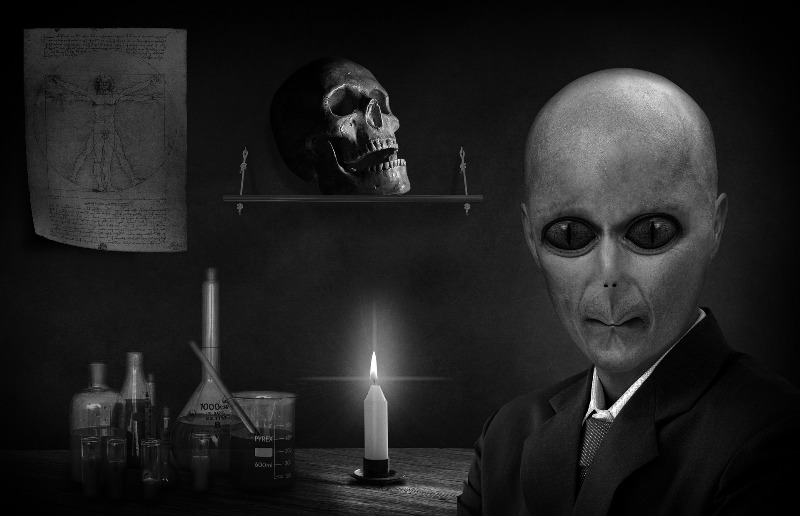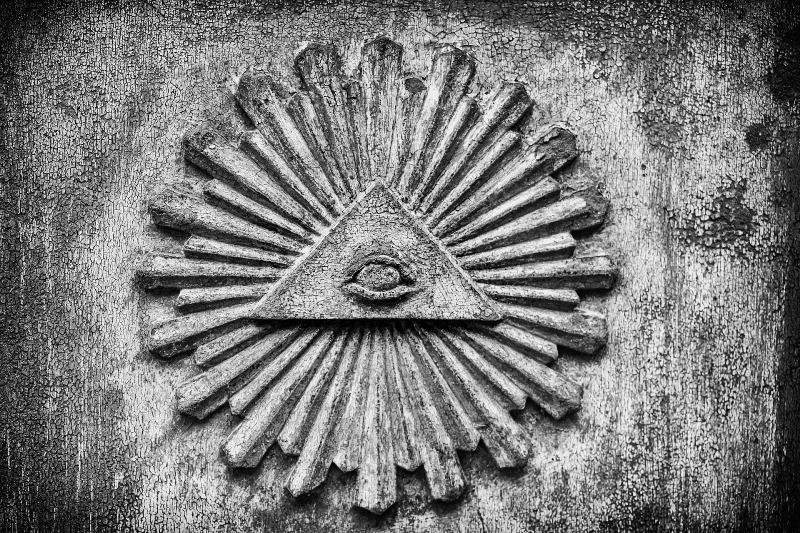A conspiracy theory is a belief or explanation that suggests that events or situations are the result of a secret, often sinister, and usually misleading conspiracy by a group of people or an organization. Such theories often involve speculation, unsubstantiated claims, or misrepresentations of facts that are used to support the belief that there is a hidden agenda behind an event. Conspiracy theories can range from the harmless and absurd to the dangerous and divisive. Despite the lack of evidence, these theories often attract a large following and can have a profound impact on society.
What is CONSPIRACY THEORY – definition and meaning in simple words.
In simple terms, Conspiracy is when someone believes that something is happening or has happened because of a secret plan developed by a group of people.
Sometimes people think that this secret plan is bad or evil, and they may not have any evidence that this is true. Conspiracy theories can be about a wide variety of things, such as aliens or replacing famous people with clones. But it’s important to remember that just because someone thinks something is a conspiracy doesn’t mean it’s actually true. It’s always a good idea to check the facts and not believe everything you hear.

Who is a conspiracy theorist. What do conspiracy theorists do?
A conspiracy theorist is a person who believes in conspiracy theories and tends to believe that there are ulterior motives behind events or situations that may not be obvious to others.
Conspiracy theorists often question the official narrative and look for evidence to support their claims, which may include unfounded rumors or unverified information. Conspiracy theorists can be found in all walks of life. They may have different motivations for their beliefs. Some people may enjoy the thrill of uncovering hidden secrets, while others may feel distrustful of the government or mainstream media.
5 Most famous conspiracy theorists and their theories.
Here are five of the most famous conspiracy theorists and their theories:
- Alex Jones: Radio show host, believes in various conspiracy theories, including that the US government was behind the 9/11 attacks.
- David Icke: British writer, believes in a wide range of conspiracy theories, including that the world is run by reptilian humanoids who control governments.
- Jesse Ventura: Former professional wrestler and politician who believes that the US government is covering up many conspiracies, including the assassination of John F. Kennedy.
- Jim Marrs: American journalist and author who has written about the conspiracy theory that the US government has kept the existence of aliens secret.
- Richard Hoagland: An American writer who believes that NASA has concealed evidence of alien structures on the Moon and Mars.
Although these people have become famous for their beliefs, it is important to remember that their theories have not been proven and cannot be supported by reliable evidence.
Types of Conspiracy Theories.
Here are some of the different types of conspiracy theories that exist:
- Political conspiracies: Assume that government officials or political leaders work together to cover up certain events.
- Historical conspiracies: These theories are related to events or figures from history, such as the assassination of John F. Kennedy or the concealment of the existence of aliens by government agencies.
- Health-related conspiracies: Involve the belief that pharmaceutical companies or healthcare providers are withholding information or actively harming society through their actions or products.
- Paranormal conspiracies: Related to supernatural or paranormal phenomena, such as the belief that secret societies control the world or that extraterrestrials have contacted humans.
- Environmental conspiracies: These theories involve the belief that environmental disasters or problems are intentionally caused or covered up by corporations or governments for their own benefit.
- Cultural conspiracies: Involve the belief that certain groups, such as minorities or marginalized communities, are discriminated against or manipulated by the dominant culture or media.
- Scientific conspiracies: These theories involve the belief that mainstream scientific theories, such as evolution or climate change, are false and are being perpetuated for political or financial gain.
- Financial conspiracies: Involves the belief that certain financial institutions or influential individuals control the economy for their own benefit. For example: belief in the “New World Order” or secret societies like the Illuminati.
- Religious conspiracies: These theories involve the belief that certain religious organizations or figures are withholding information or performing covert actions for their own benefit. For example: the belief that the Vatican is hiding evidence of extraterrestrial life or that secret societies control the world’s religions.
It is important to remember that conspiracy theories often lack evidence and can be harmful, leading to paranoia, fear, and distrust of others. It is very important to approach any theory with a critical and open mind, evaluate the evidence presented and look for reliable sources before forming any beliefs or opinions.

Psychology of conspiracy theories, and why do people believe in them?
The psychology of conspiracy theories is a complex field of study that has been studied by psychologists and sociologists for decades. The most common explanation for why people believe in conspiracy theories is that they provide a sense of control and understanding in an uncertain world. For example, the 9/11 truth movement suggests that the government was involved in the terrorist attacks. This can give people a sense of control over events that seemed senseless and chaotic.
Other research suggests that people who believe in conspiracy theories have higher levels of suspicion and distrust of government officials. This may be a result of experiences of marginalization or oppression, or lack of access to reliable sources of information. In some cases, conspiracy theories may be a reaction to real events that have been hidden or distorted by the powerful.
One study conducted by researchers at the University of Kent found that people who believe in conspiracy theories have higher rates of intuitive thinking and lower rates of analytical thinking. This suggests that belief in conspiracy theories may be related to a preference for intuitive, quick thinking over more deliberate, analytical thinking.
It is important to note, however, that not all people who believe in conspiracy theories fit this profile, and not all conspiracy theories are created equal. Some of them may be based on real events and legitimate concerns, while others are completely unfounded and can have harmful consequences.
All in all, the psychology of conspiracy theories is a complex and multifaceted field of study. There is still much to be learned about why people believe in them and how to effectively combat and counter harmful conspiracy theories.
Top 10 most famous conspiracy theories.
- JFK assassination: The theory revolves around the assassination of President John F. Kennedy. Many people believe that Lee Harvey Oswald did not act alone and that a larger conspiracy was involved.
- 9/11: This theory suggests that the US government was involved in the 9/11 terrorist attacks and organized them to justify going to war in the Middle East.
- Area 51 and aliens: The theory centers around the secret military base Area 51. Many believe that it is the site of extraterrestrial activity and that the government is hiding evidence of their existence.
- Moon landing hoax: This theory claims that the Apollo moon landing in 1969 was staged and never really happened.
- Flat Earth: The theory claims that the Earth is not round but flat, and that there is a global conspiracy to hide this fact.
- The Illuminati: This theory revolves around a secret society known as the Illuminati, which allegedly controls world events and governments from behind the scenes.
- Reptilian elite: This theory claims that shape-shifting reptilian aliens have infiltrated and control world governments and financial institutions.
- COVID-19 conspiracy theories: Similar theories revolve around the COVID-19 pandemic. Some believe the virus is a hoax or was deliberately created as a biological weapon.
- New World Order: The theory suggests that a secret group of elites is working to create a totalitarian world government.
- Holocaust denial: This theory claims that the Holocaust, in which millions of Jews were murdered by the Nazis during World War II, never actually happened or was exaggerated.

How to debunk conspiracy theories: Tips and strategies for critical thinking.
If you come across a conspiracy theory that seems questionable, it is important to use critical thinking and evaluate the evidence before accepting or rejecting it. Here are some tips and strategies for debunking conspiracy theories:
- Look for credible sources of information and evidence to support or refute the theory.
- Use the principles of Occam’s Razor and Hanlon’s Razor, which state that the simplest explanations are usually the most plausible and not everything is the result of malice.
- Examine the motives of those promoting the theory and consider whether they have a vested interest in it.
- Be prepared to change your mind if new evidence comes to light.
- Avoid the authority of the individual and focus on the evidence and arguments presented by the theory.

Pros and cons of conspiracy theories.
Conspiracy theories have both potential advantages and disadvantages. Here are some of the most significant pros and cons:
Pros:
- Holding institutions accountable: Conspiracy theories can sometimes expose wrongdoing by powerful institutions and individuals.
- Promoting critical thinking: Exploring and evaluating conspiracy theories can help people develop critical thinking skills and challenge the status quo.
- Providing alternative points of view: Conspiracy theories can offer alternative explanations and perspectives that may be ignored by mainstream media and institutions.
Cons:
- Spreading disinformation: Conspiracy theories can spread false or unverified information, leading to confusion and distrust of legitimate sources of information.
- Undermining trust in institutions: Believing in conspiracy theories can undermine trust in important institutions, such as government and academia, which can have dangerous consequences.
- Encouraging extremist and paranoid thinking: Conspiracy theories can sometimes lead to extremist and paranoid thinking, which can be harmful to individuals and to society as a whole.

Interesting facts about conspiracy theories.
- The term “Conspiracy” originated in the 19th century and was originally used to describe a conspiracy by a group of Jesuit priests to overthrow the British government.
- A 2016 study found that people more likely to believe in conspiracy theories are more likely to have lower levels of education and income, and to distrust institutions.
- The assassination of President John F. Kennedy in 1963 remains one of the most popular and persistent conspiracy theories, as most Americans believe that Lee Harvey Oswald did not act alone.
- In 1998, former professional wrestler Jesse Ventura was elected governor of Minnesota, running a campaign that actively promoted his belief in various conspiracy theories.
- In recent years, social media has played a significant role in the spread of conspiracy theories. Many online communities have emerged to discuss and promote these theories.
Conclusion.
Consequently, conspiracy theories have been around for centuries, and they continue to capture the imagination of people around the world. While there may be a kernel of truth in some theories, many are baseless and rely on faulty logic and speculation. It is important to approach conspiracy theories with a critical and skeptical mindset and evaluate them based on evidence and facts. Spreading disinformation and distrust of institutions can have serious consequences, so it is important to educate yourself and others to think critically and distinguish between fact and fiction. Resources for further reading and education on conspiracy theories and critical thinking include scholarly journals, fact-checking websites, and books on critical thinking and cognitive bias. By staying informed and developing critical thinking skills, we can better navigate the world of conspiracy theories and make informed decisions based on evidence and facts.

FAQ (Frequently Asked Questions):
Conspiracy is a belief that suggests that a particular event or situation is the result of a secret, often sinister conspiracy by a group of people or organizations.
People believe in conspiracy theories for a variety of reasons, such as distrust of the government and mainstream media, fear of the unknown, and a desire to make sense of complex events.
Not all conspiracy theories are false. However, many of them lack reliable evidence or contradict established scientific knowledge.
Yes, conspiracy theories can be harmful. They can spread disinformation and undermine trust in institutions, which can lead to negative consequences.
Among the famous conspiracy theories are the assassination of John F. Kennedy, the moon landing hoax, and the 9/11 thesis.
No, not all conspiracy theorists are paranoid. Some people can believe in conspiracy theories without being paranoid.
You can avoid succumbing to conspiracy theories by verifying information, being skeptical of unconfirmed claims, and seeking out reliable sources of information.
Yes, conspiracy theories can be based on real events. However, it is important to examine the evidence and use critical thinking skills to evaluate the information presented.
It is possible to change a conspiracy theorist’s mind, but it requires patience, empathy, and fact-based arguments.




